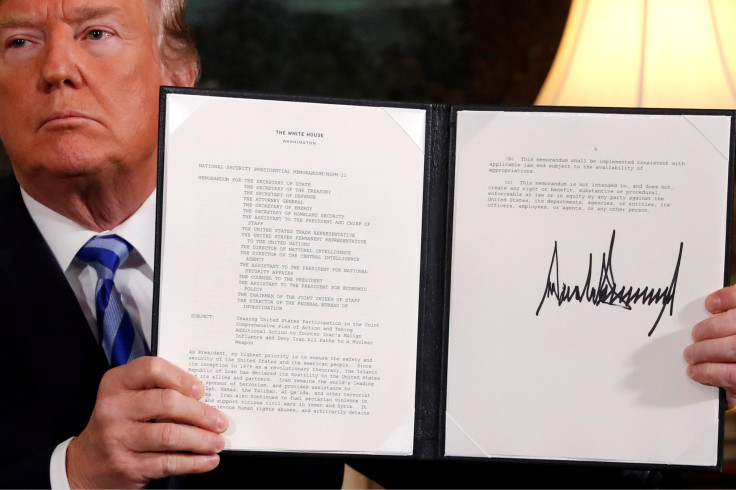Iran Nuclear Deal: Rejected By Trump, Europe Desperately Trying To Salvage It

While withdrawing from the Joint Comprehensive Plan of Action (JCPOA) on May 8, President Donald Trump called the current agreement structure “decaying and rotten.” He also added United States would be working with its allies to find a “real, comprehensive” solution to restrain Iran and its nuclear ambitions.
With withdrawal from the JCPOA, the U.S. has re-imposed the highest level of economic sanctions on Iran. However, the European Union (EU) is currently rushing to shield Iran from these sanctions.
British Prime Minister Theresa May during a call to Iranian President Hassan Rouhani stressed the country’s commitment to the JCPOA. She also added the United Kingdom, France and Germany will present a set of initiatives Tuesday in Brussels to Iran’s Foreign Affairs Minister Mohammad Javad Zarif to ensure the continued implementation of JCPOA. Iran's ambassador to the U.K. also tweeted about the call.
PM Theresa May informed President Rouhani in her call today that UK, France and Germany will present on Tuesday in Brussels a package of initiatives to FM Zarif, to protect implementation of #JCPOA and ensuring that Iran will enjoy from the economic benefit of the deal.
— Hamid Baeidinejad (@baeidinejad) May 14, 2018
A spokesperson for May’s office said, “The Prime Minister made clear that the UK condemns the Iranian missile attacks against Israeli forces and called on Iran to refrain from any further attacks. She said it was important to avoid provocative actions to ensure peace and security in the region,” BBC reported.
But, why is Europe scrambling to defend and save the Iran nuclear deal?
It took more than 10 years for EU and the member states — U.K., France and Germany — to create the deal, which with all its shortcomings did fulfill the purpose. The withdrawal of the U.S. from the deal does not mean it has ended; however, it is an offense to EU — one of the closest ally to the former nation.
Europe seemed to have realized Trump’s plan to come up with a better deal is not feasible, considering the long and turbulent history of the JCPOA, and given the current situation, if not fixed promptly, the region might face the risk of a war or a nuclear arms race.
Ultimately, it is up to Iran to decide whether to accept the agreement with limited benefits or imitate U.S. and depart. If the latter happens, Iran’s nuclear progress could lead to a combined bombing campaign by U.S. and Israel. In retaliation, Iran would mobilize allies such as Iraq, Lebanon and Syria, leading to a full-fledged war in Europe’s neighborhood, which would put the continent also at risk. However, this would not do anything to Iran’s nuclear program also.
Another possibility is that Trump does manage to destabilize Iran’s regime. This prospect comes with its own set of complications. Creating unrest in Iran could cause a spillover in the rest of West Asia, the most incandescent region in the world, and would lead to the creation of more refugees. Apart from this, energy prices would rise, trafficking would increase and terrorist activities would flourish.
Trade is another reason EU will be looking to save the deal. European Union was Iran’s largest trade partner before sanctions were imposed in 2006. France-Iran trade also took a hit in 2006, but it grew 118 percent from January-October 2017 when the sanctions were lifted.
Germany, which has had trade relations with Iran since the 1970s, was also witnessing an increase in its exports. Countries such as Spain, Austria and the Netherlands also benefit from the trade relations with Iran. These exports include boilers, pharmaceutical and chemical products, vehicles, machinery, aircraft, plastics, spacecraft, nuclear reactors, etc.
Responding to the U.S. move, French Finance Minister Bruno Le Maire, said Europe should not accept the former as the “world’s economic policeman,” or become nations that “obey decisions taken by the United States while clinging to the hem of their trousers.”
© Copyright IBTimes 2024. All rights reserved.





















